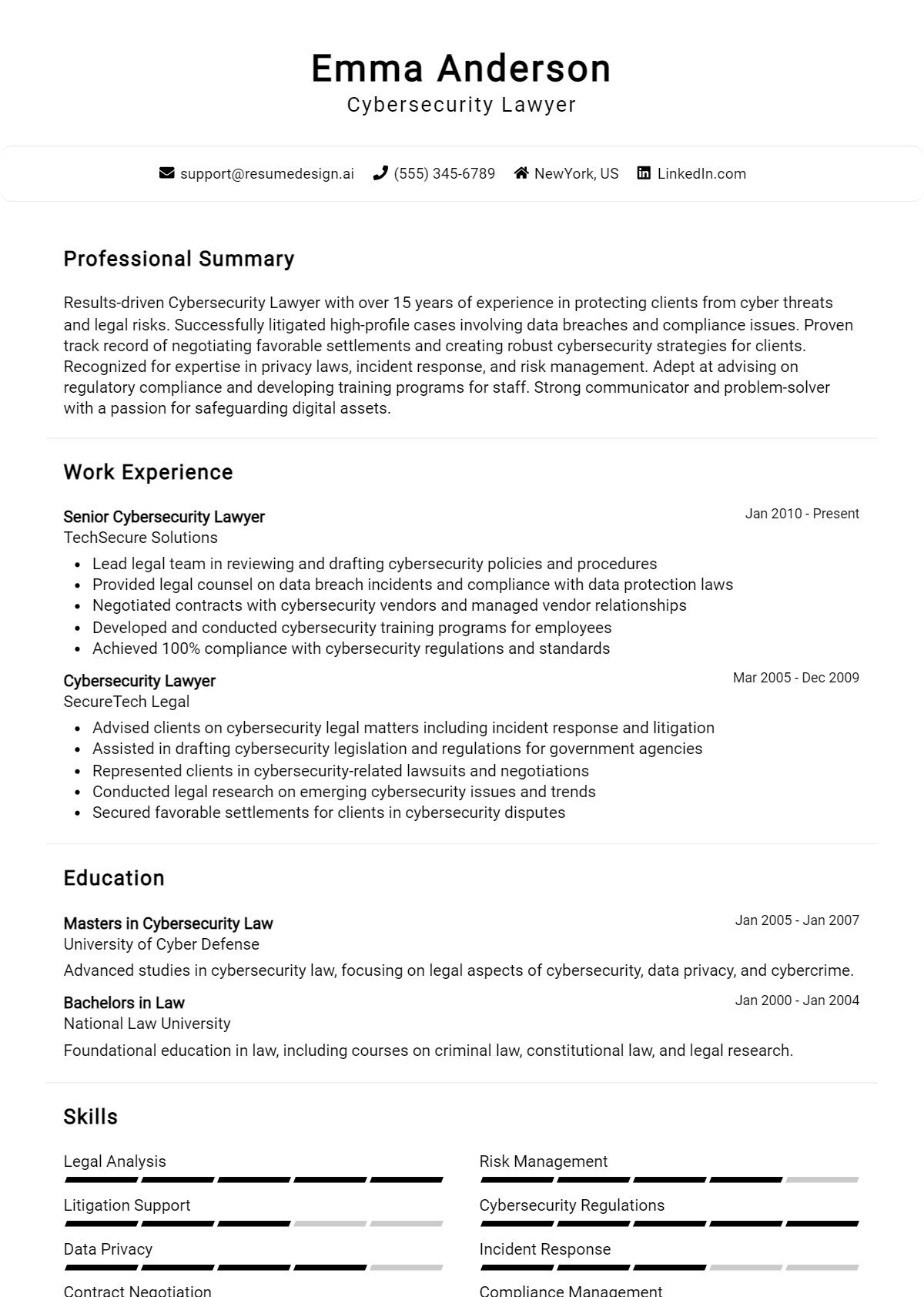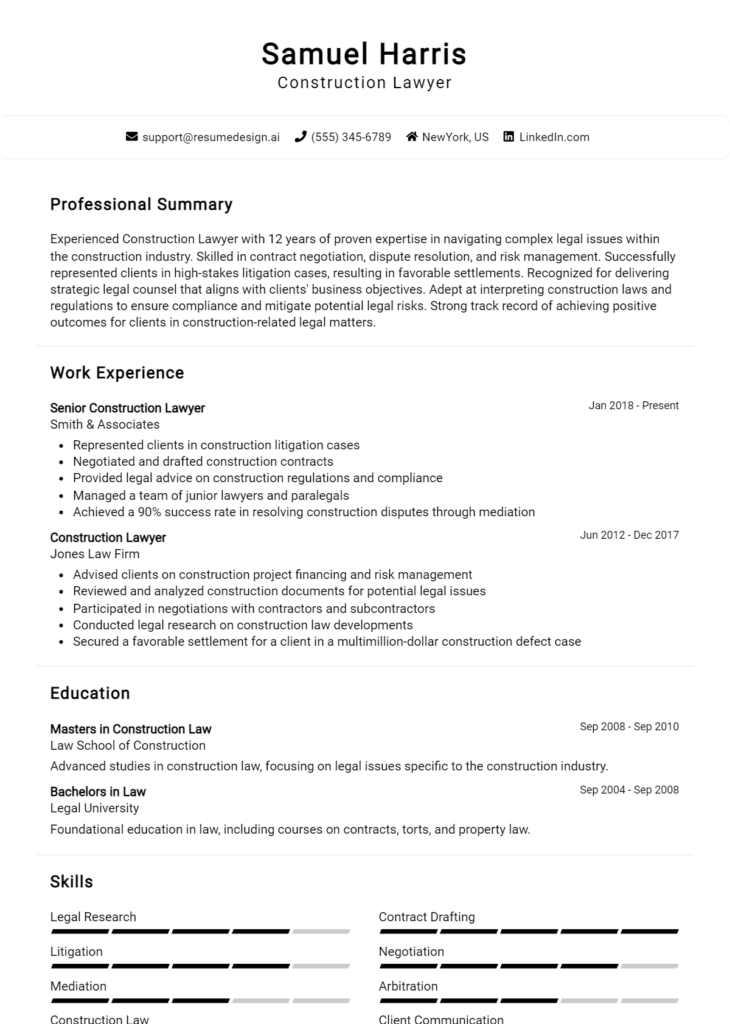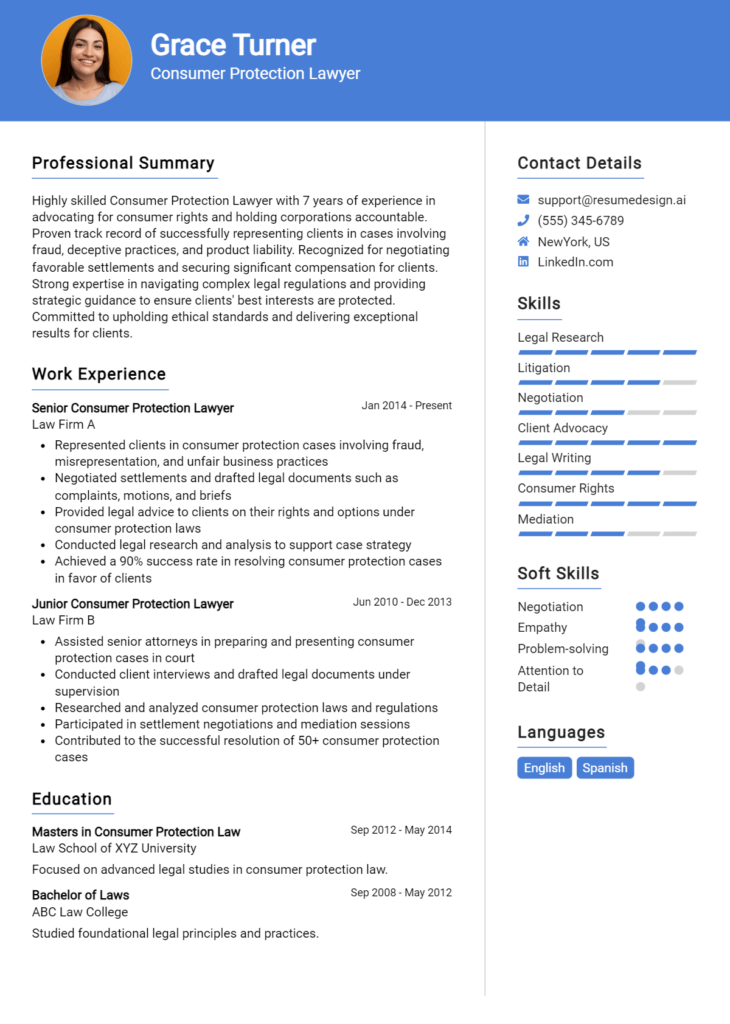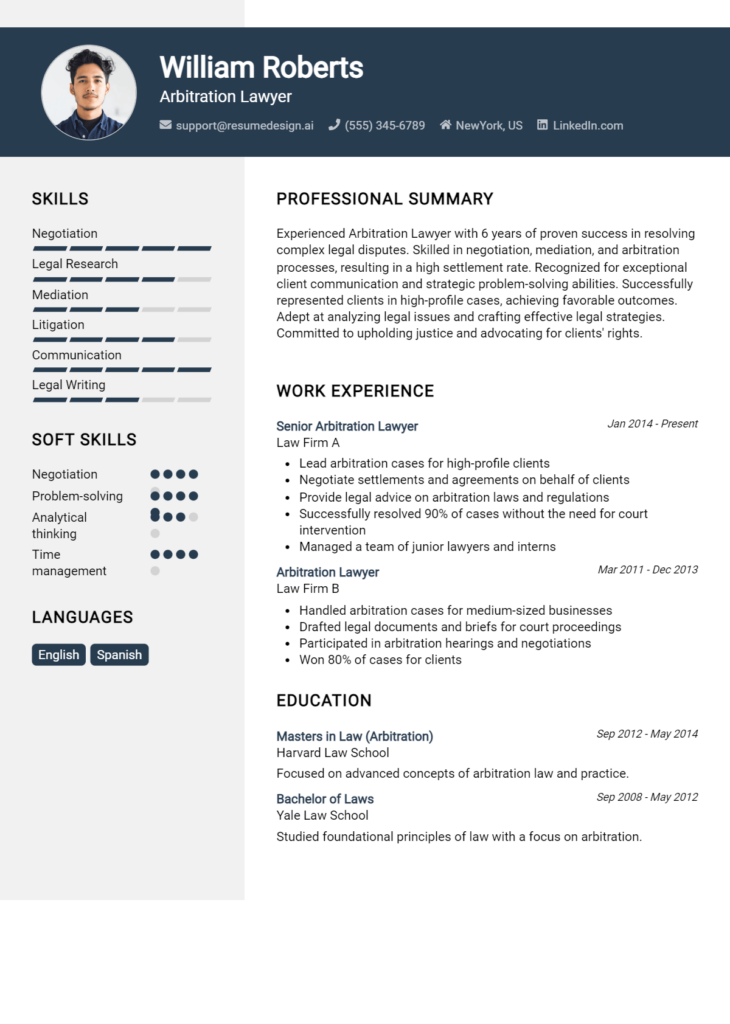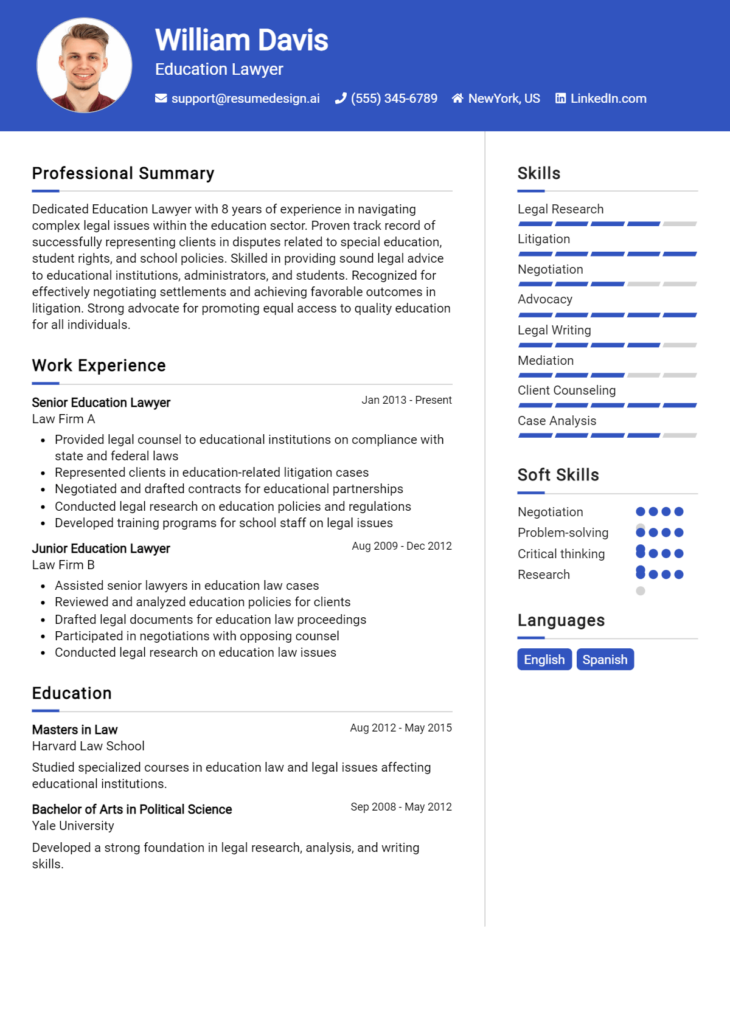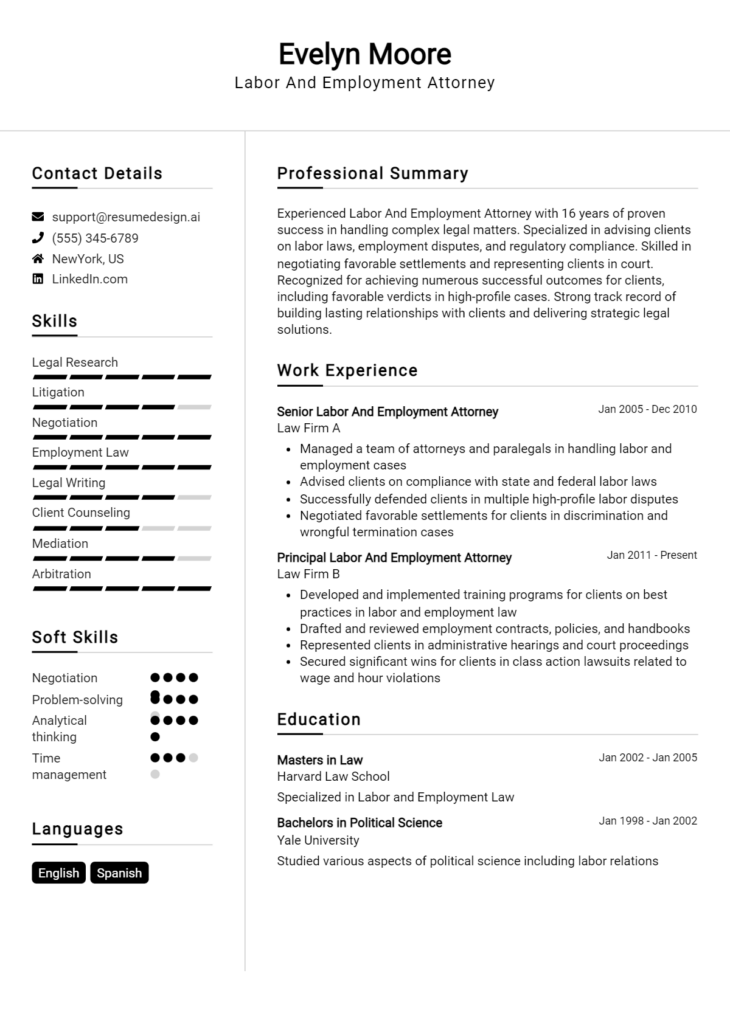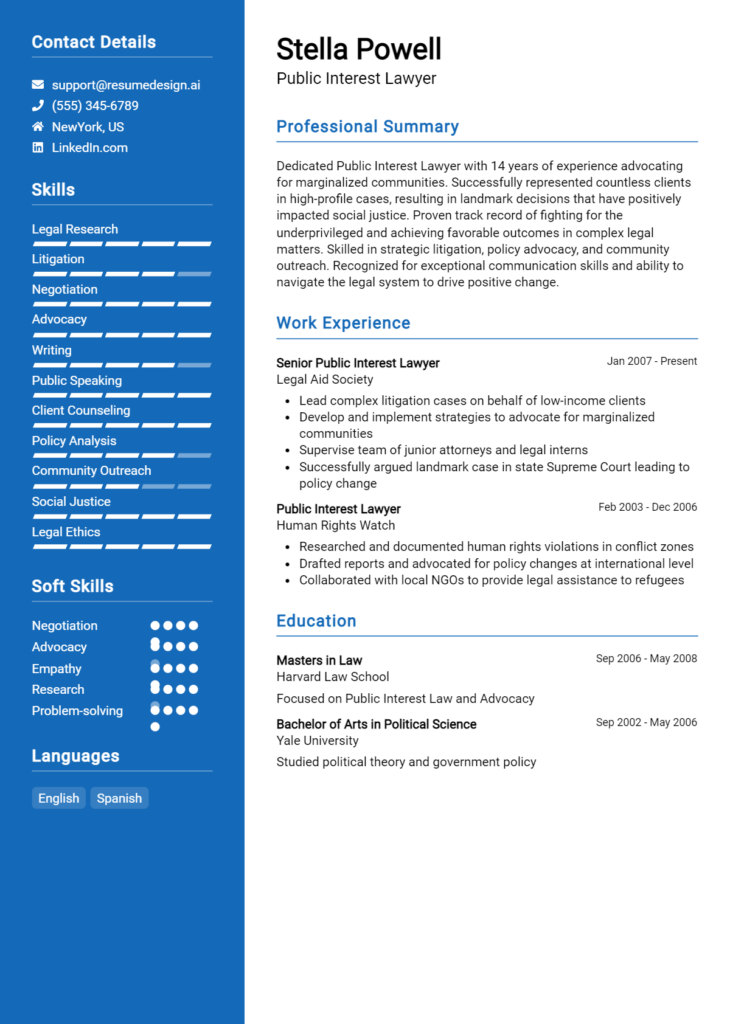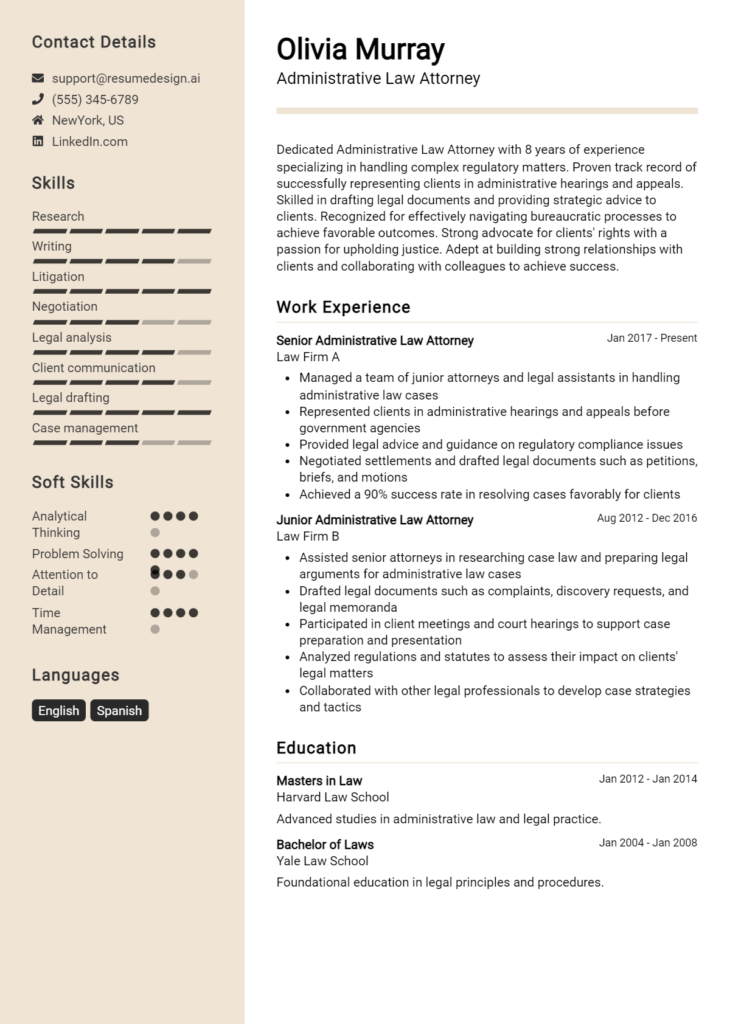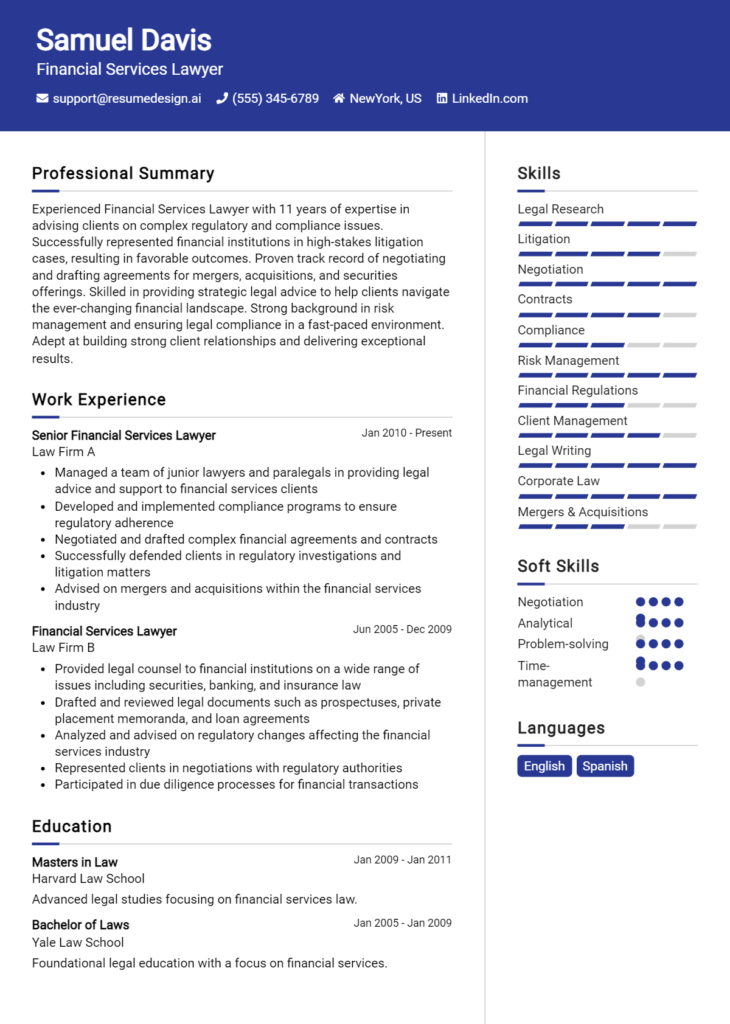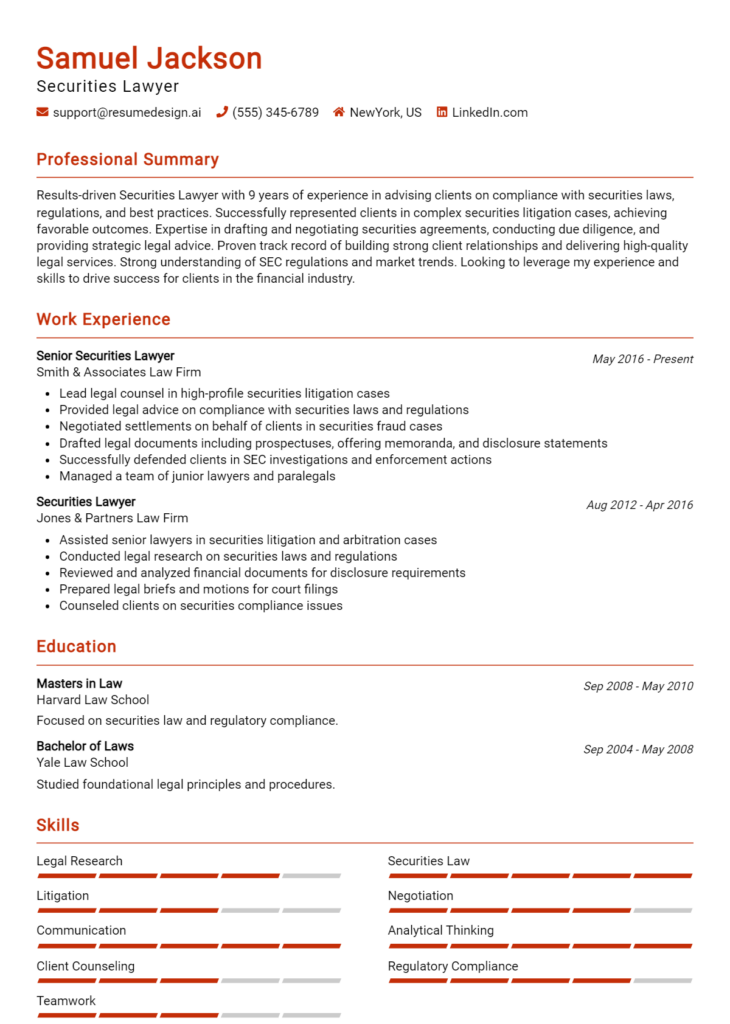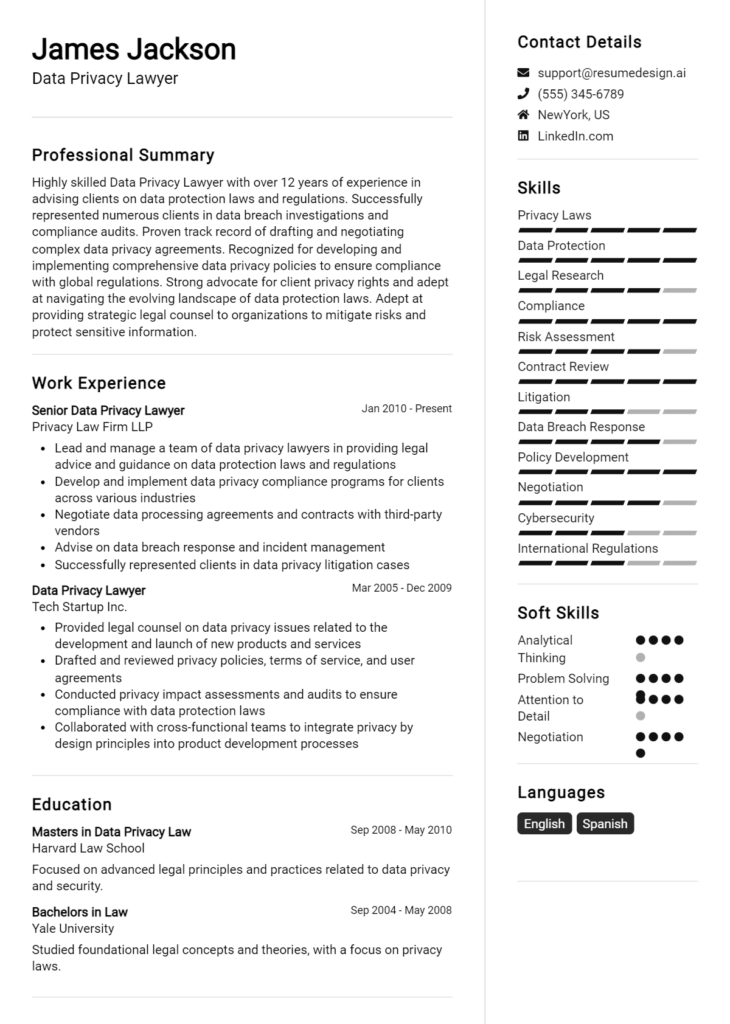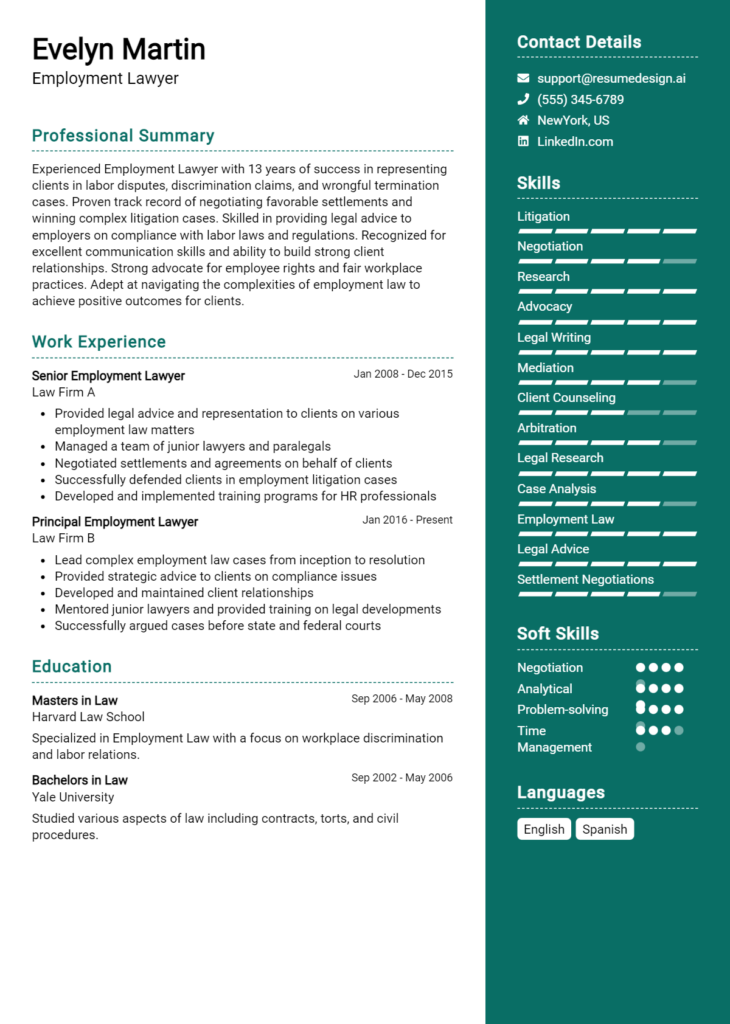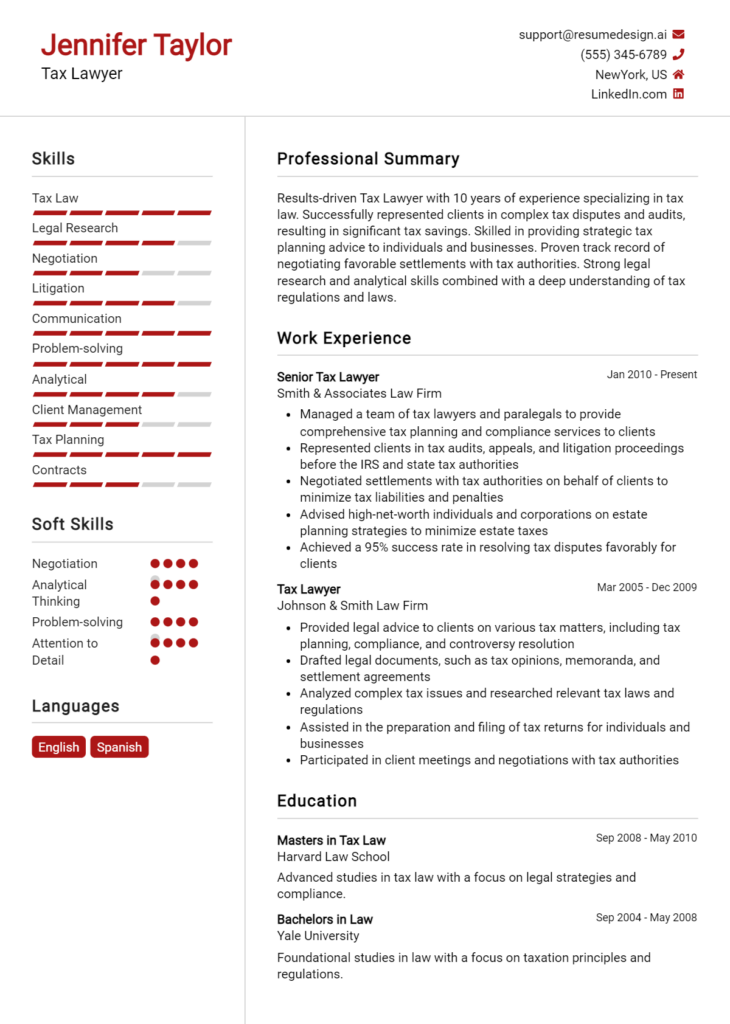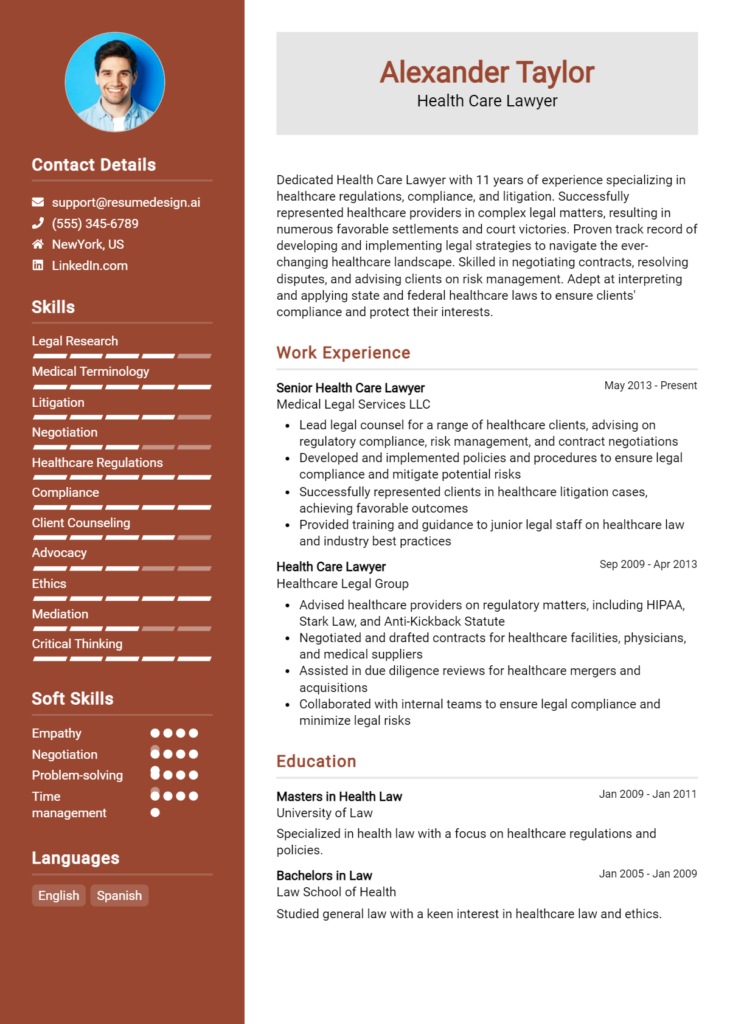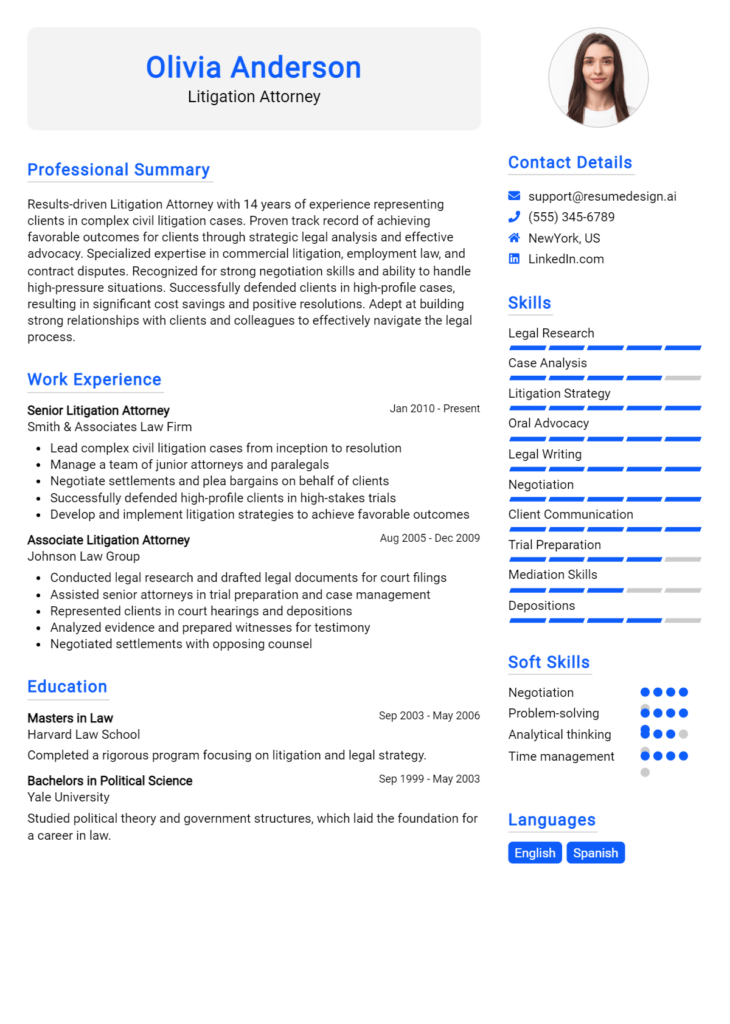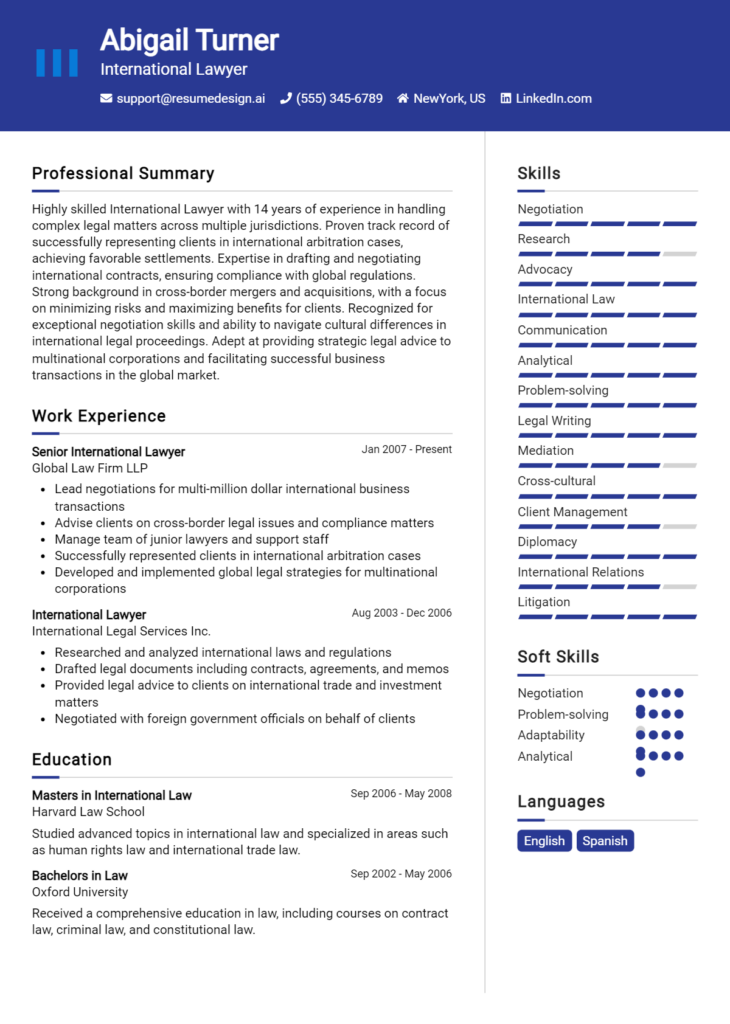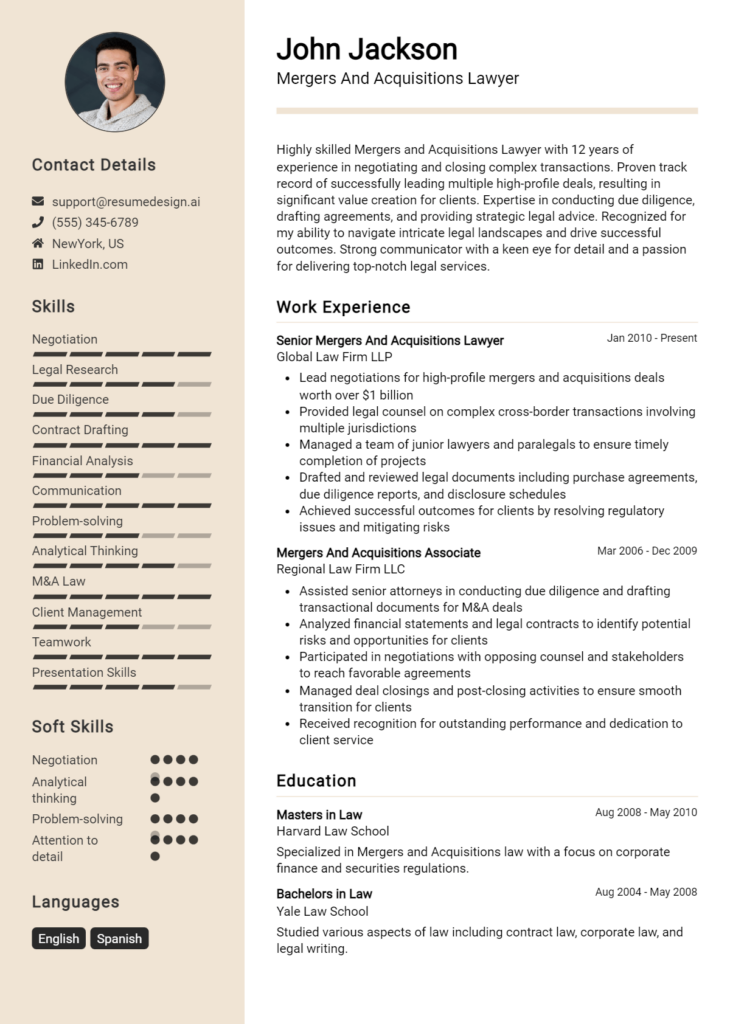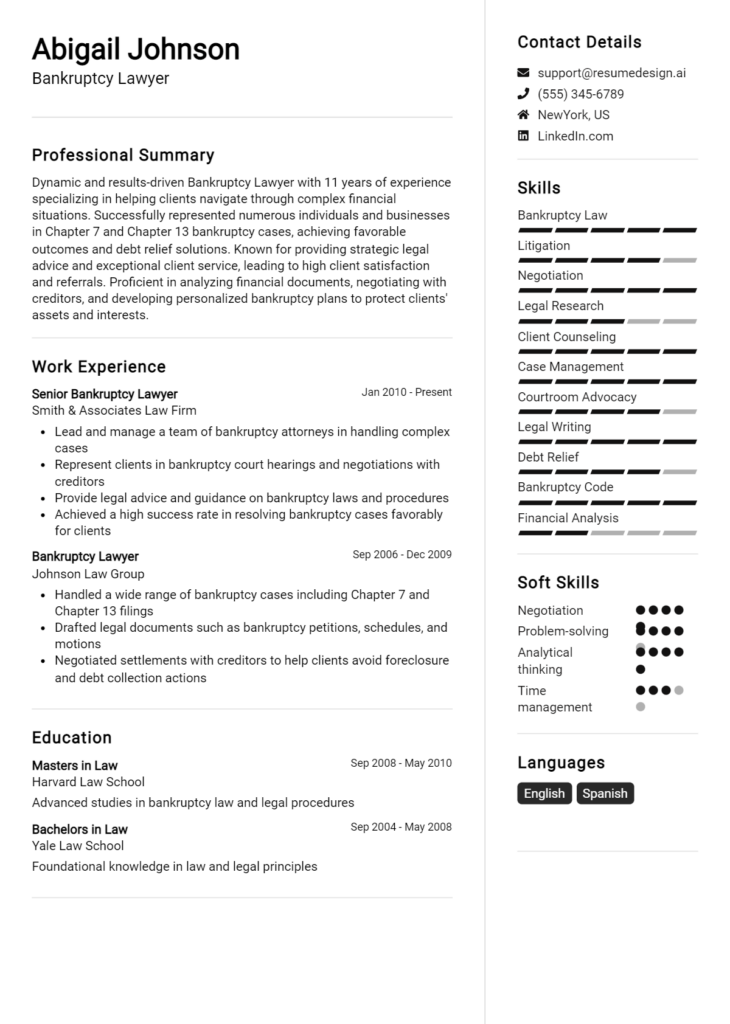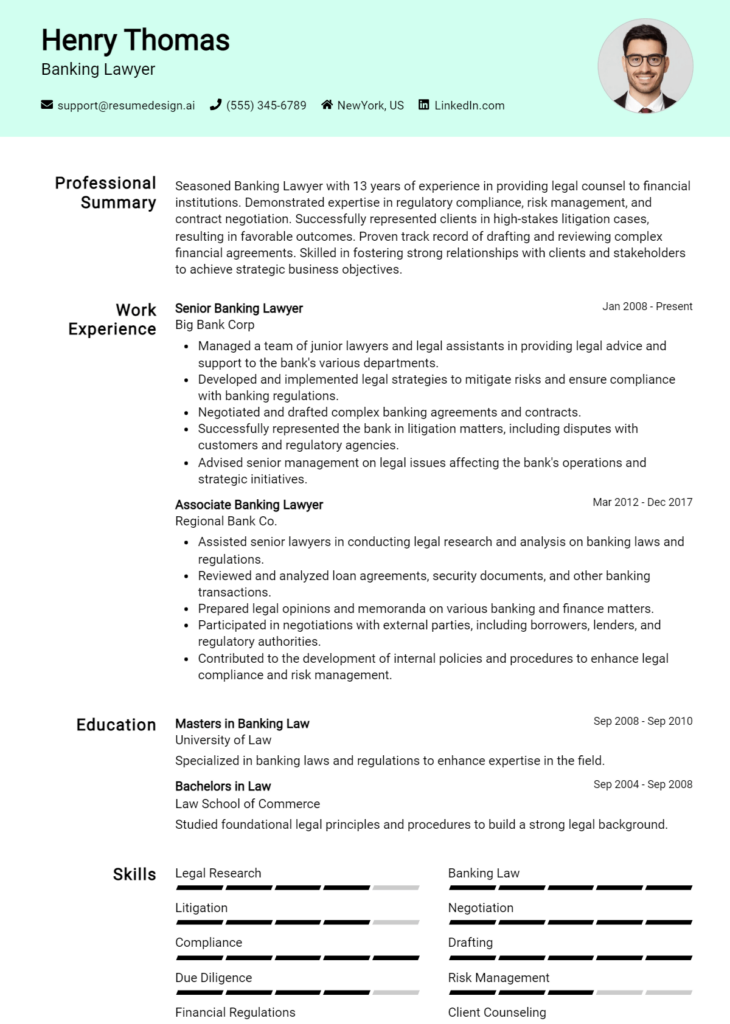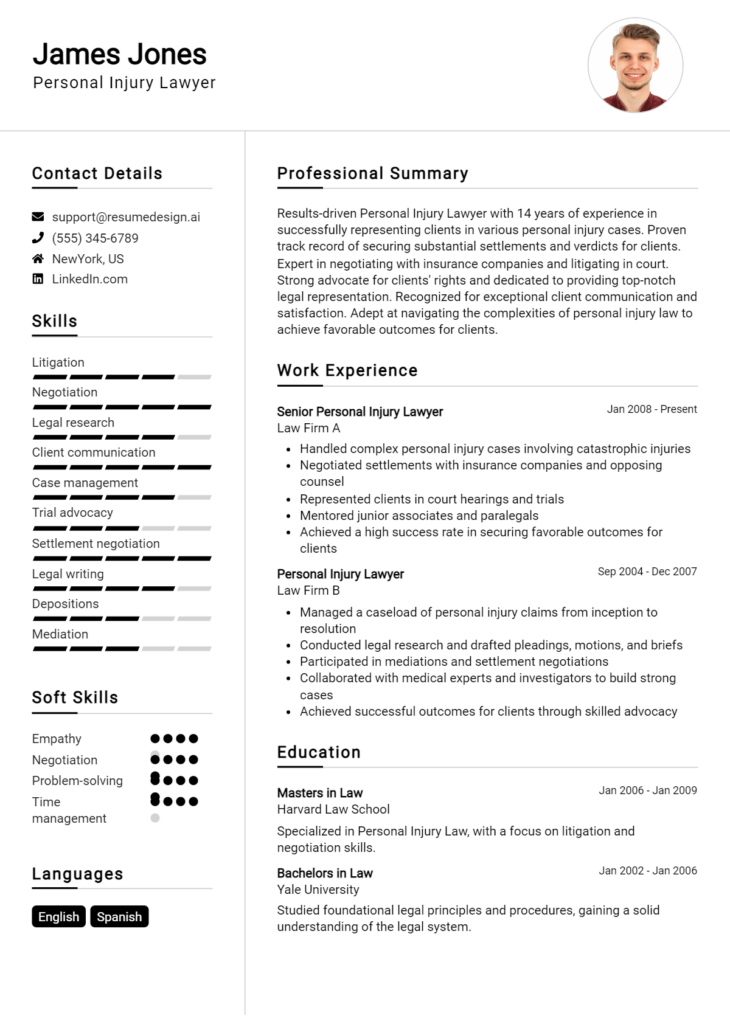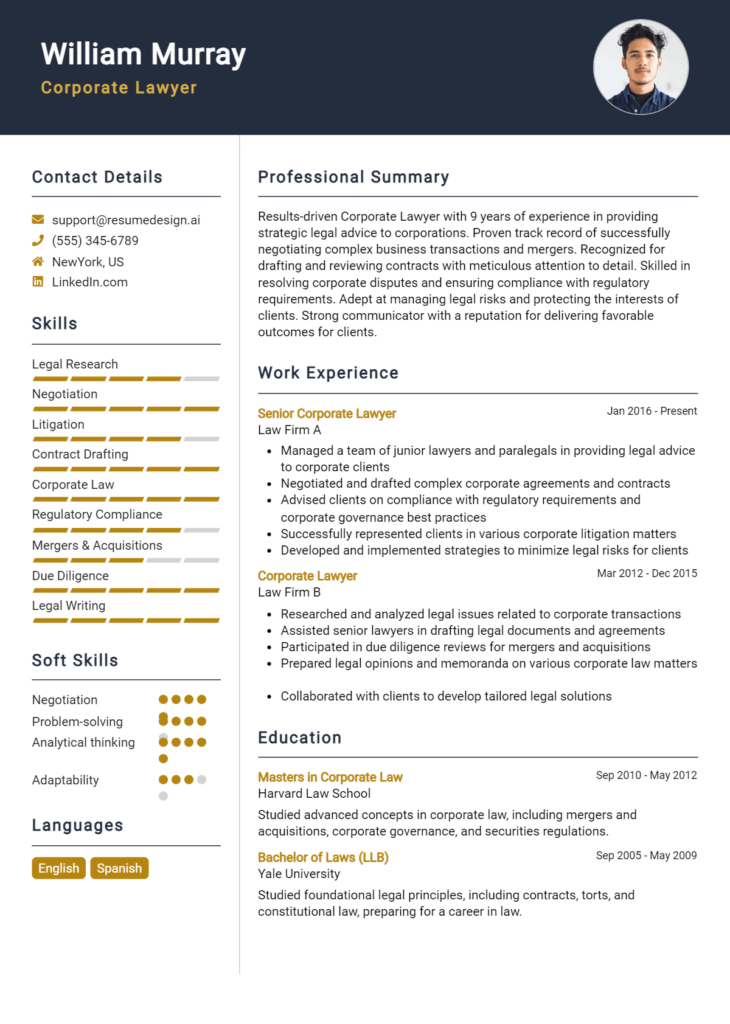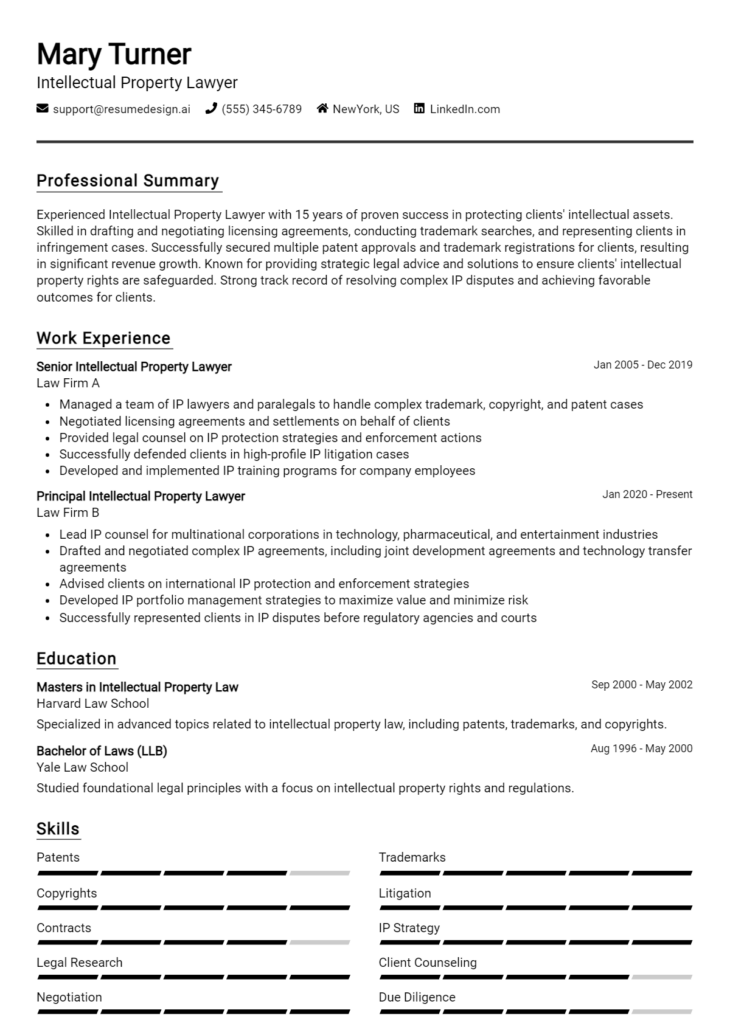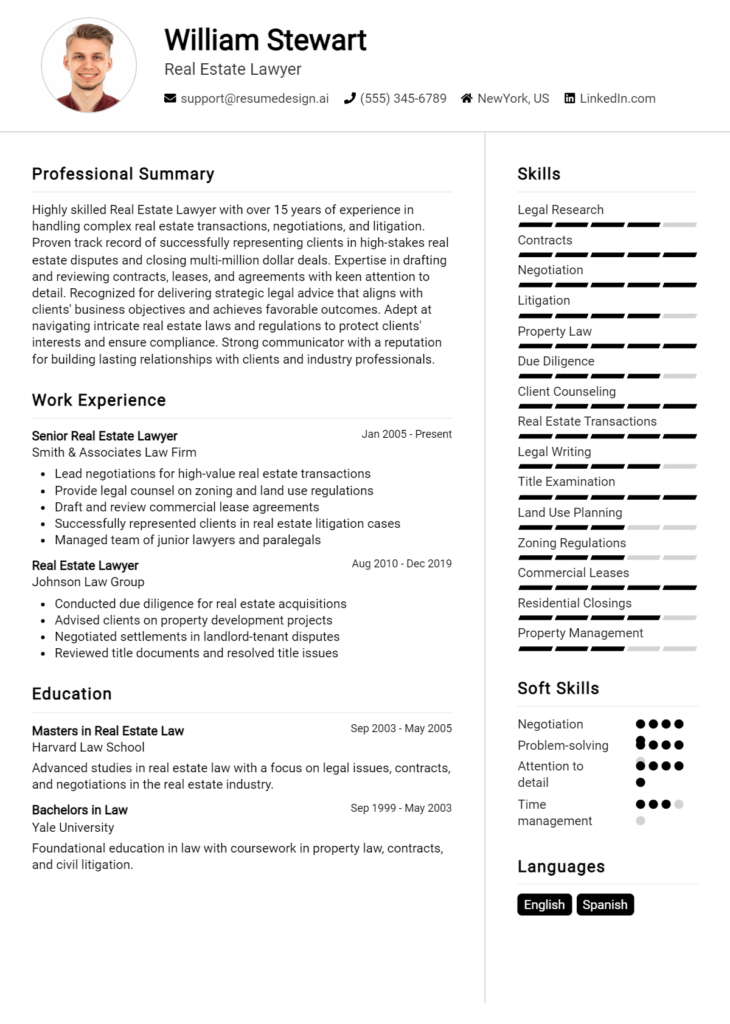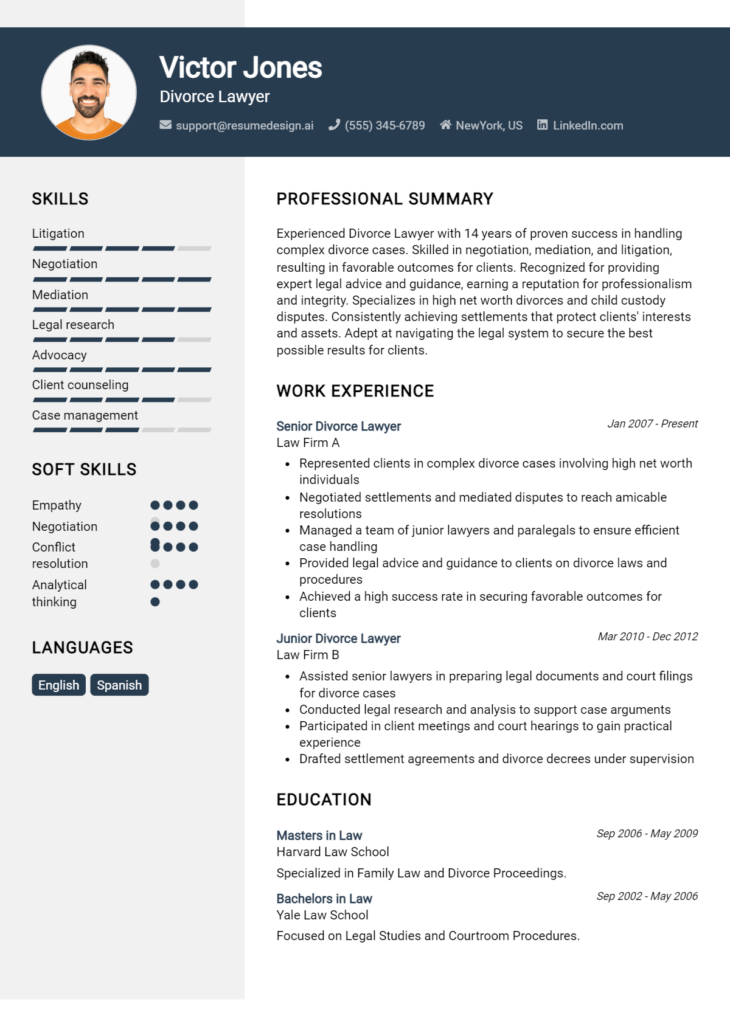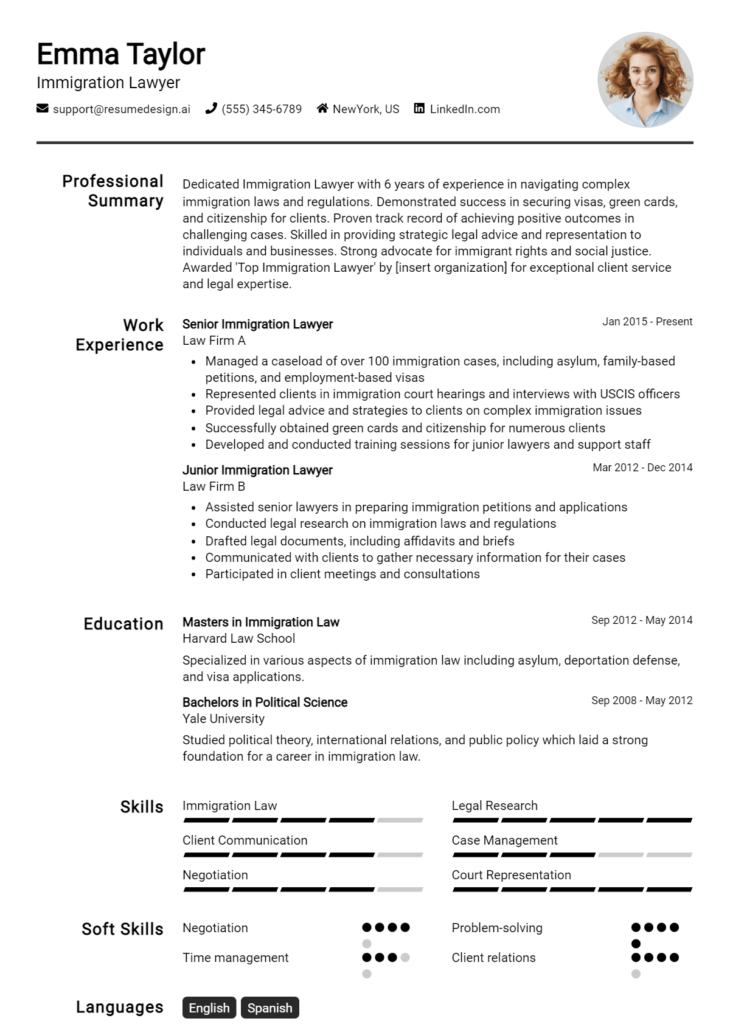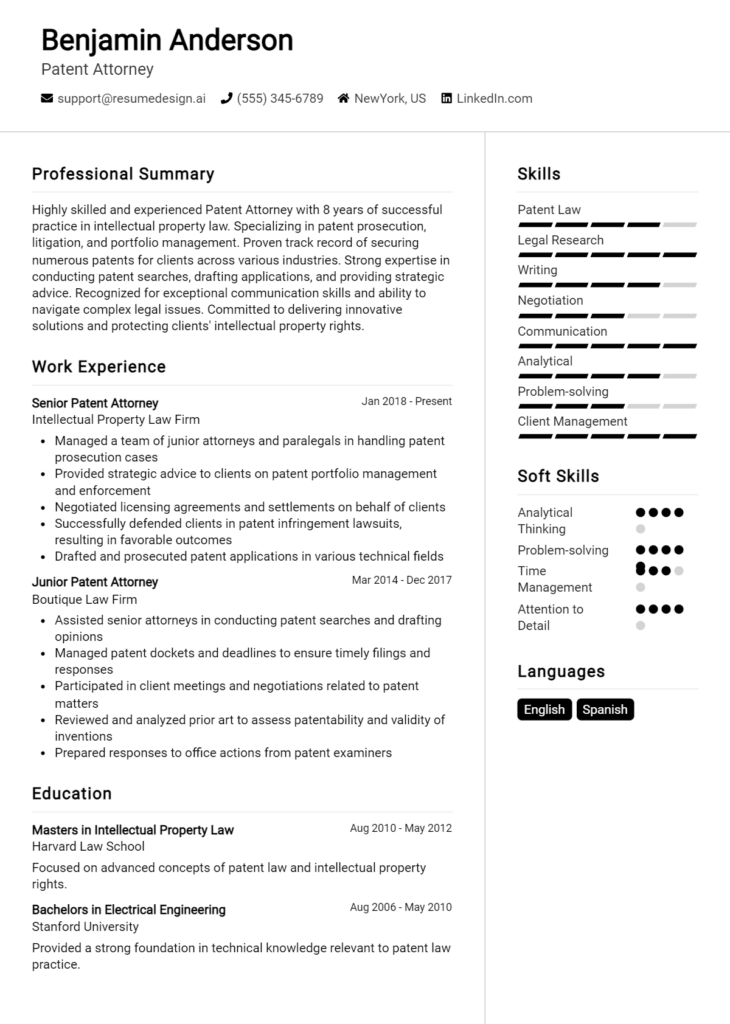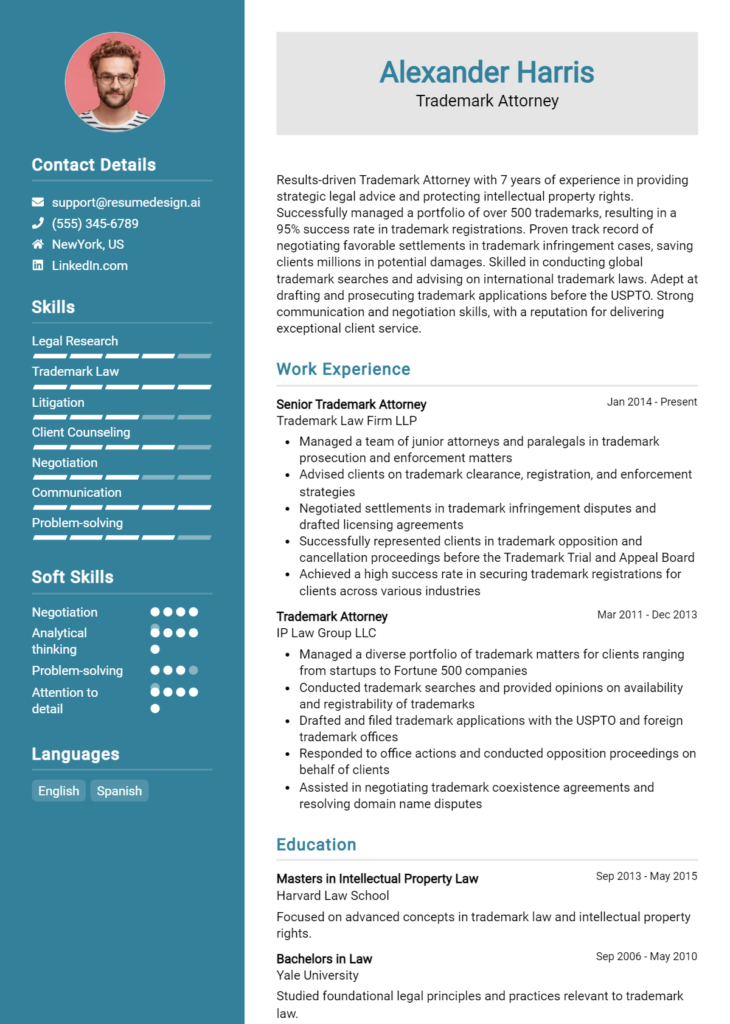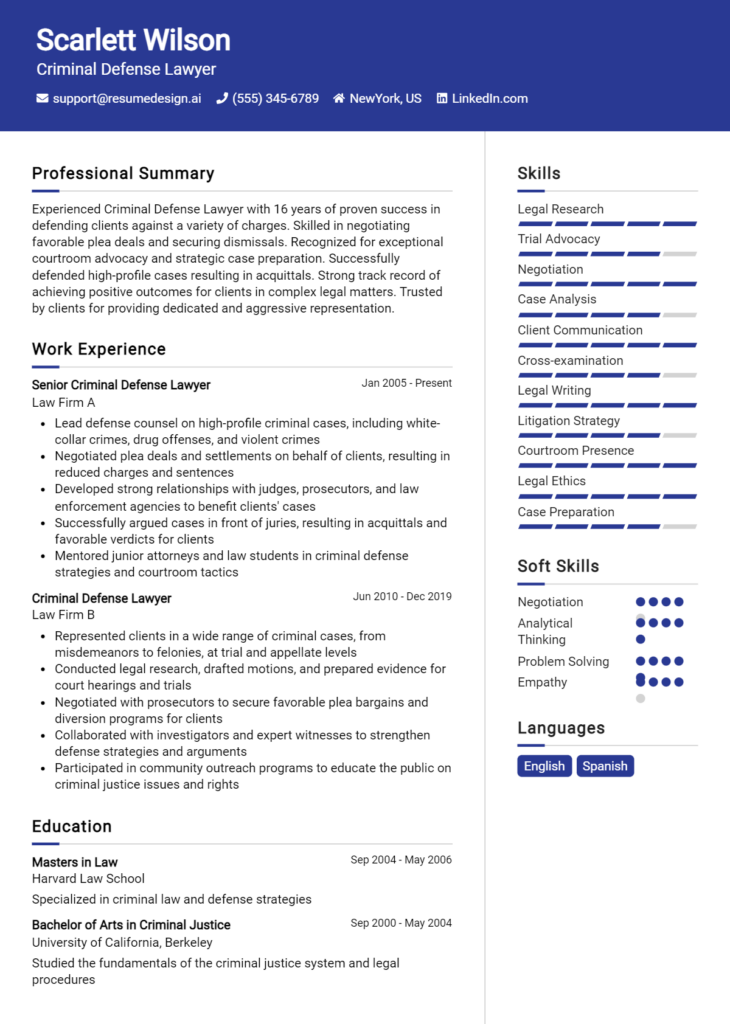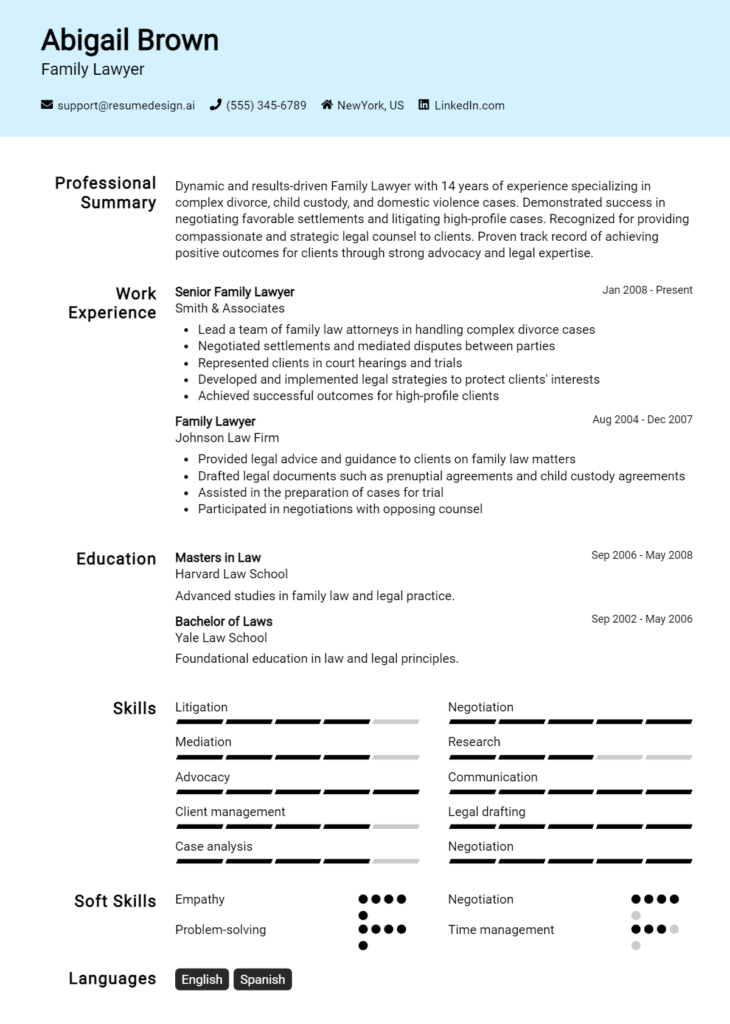Cybersecurity Lawyer Core Responsibilities
A Cybersecurity Lawyer plays a crucial role in safeguarding an organization’s digital assets by navigating complex legal frameworks and compliance requirements. This position requires a blend of legal expertise, technical knowledge, and strong problem-solving skills to effectively bridge the gap between IT, legal, and operational departments. A successful Cybersecurity Lawyer not only ensures adherence to cybersecurity laws but also contributes to strategic decision-making, enhancing the organization’s risk management posture. A well-structured resume can effectively highlight these essential qualifications, showcasing the candidate's ability to contribute to the overall goals of the organization.
Common Responsibilities Listed on Cybersecurity Lawyer Resume
- Advising on compliance with cybersecurity regulations and standards.
- Drafting and reviewing cybersecurity policies and incident response plans.
- Conducting risk assessments and legal audits related to cybersecurity.
- Representing the organization in cybersecurity litigation and disputes.
- Collaborating with IT and security teams to ensure legal alignment.
- Monitoring changes in cybersecurity laws and advising stakeholders.
- Providing training on legal implications of cybersecurity issues.
- Negotiating contracts that involve data protection and security provisions.
- Developing strategies for breach response and data protection compliance.
- Conducting investigations into data breaches and cyber incidents.
- Engaging with regulatory bodies regarding cybersecurity matters.
- Assessing the legal impact of emerging technologies on cybersecurity.
High-Level Resume Tips for Cybersecurity Lawyer Professionals
In the competitive field of cybersecurity law, a well-crafted resume is not just a formality; it is a critical tool that can significantly influence your career trajectory. As the first impression a potential employer will have of you, your resume must effectively showcase your unique blend of legal expertise, technical understanding, and relevant experience in the cybersecurity domain. It should reflect both your skills and achievements in a manner that resonates with hiring managers and sets you apart from other candidates. This guide will provide practical and actionable resume tips specifically tailored for Cybersecurity Lawyer professionals, helping you to create a standout application that opens doors to exciting opportunities.
Top Resume Tips for Cybersecurity Lawyer Professionals
- Tailor your resume to the specific job description, emphasizing the skills and experiences that are most relevant to the position.
- Highlight your legal qualifications, including any certifications or degrees specifically related to cybersecurity law.
- Showcase relevant experience in cybersecurity, such as previous roles or projects that involved data protection, compliance, or incident response.
- Quantify your achievements wherever possible, using metrics to demonstrate the impact of your work, such as reduced legal risks or successful litigation outcomes.
- Include industry-specific skills, such as familiarity with regulatory frameworks (e.g., GDPR, HIPAA) and cybersecurity technologies.
- Utilize action verbs to describe your responsibilities and accomplishments, making your contributions clear and compelling.
- Incorporate keywords from the job listing to pass through Applicant Tracking Systems (ATS) and catch the attention of hiring managers.
- Maintain a clean, professional layout with clear section headings, ensuring easy readability and a polished look.
- Consider including a brief summary or objective statement at the beginning of your resume to encapsulate your career goals and key qualifications.
By implementing these tips, you can significantly enhance your resume and increase your chances of landing a job in the Cybersecurity Lawyer field. A thoughtfully tailored resume that effectively communicates your unique qualifications and achievements will not only capture the attention of potential employers but also position you as a strong candidate in this rapidly evolving legal landscape.
Why Resume Headlines & Titles are Important for Cybersecurity Lawyer
In the competitive field of cybersecurity law, a well-crafted resume headline or title plays a crucial role in capturing the attention of hiring managers. A strong headline can effectively summarize a candidate's key qualifications and set the tone for the rest of the resume. It should be concise, relevant, and directly related to the job being applied for, allowing potential employers to quickly gauge the applicant's suitability for the role. An impactful resume headline not only showcases the applicant's expertise but also creates a lasting first impression, increasing the chances of being noticed in a crowded job market.
Best Practices for Crafting Resume Headlines for Cybersecurity Lawyer
- Keep it concise; aim for one impactful phrase.
- Use industry-specific keywords to highlight relevance.
- Focus on key skills that align with the job description.
- Incorporate quantifiable achievements when possible.
- Make it unique to stand out among other applicants.
- Reflect your professional brand and career goals.
- Avoid jargon; ensure clarity for a broader audience.
- Tailor the headline for each specific job application.
Example Resume Headlines for Cybersecurity Lawyer
Strong Resume Headlines
"Cybersecurity Lawyer Specializing in Data Privacy and Compliance"
“Experienced Cyber Law Attorney with Proven Track Record in Incident Response”
“Dynamic Legal Professional with Expertise in Cybersecurity Regulations and Risk Management”
“Innovative Cybersecurity Lawyer with 10+ Years in Technology Law and Litigation”
Weak Resume Headlines
“Lawyer Looking for a Job”
“Cybersecurity Professional”
“Experienced in Various Legal Fields”
The strong headlines are effective because they are specific, highlighting the candidate's skills and experiences that directly relate to the cybersecurity law field. They utilize relevant keywords and convey a clear professional identity, making it easy for hiring managers to understand what the candidate offers. In contrast, the weak headlines fail to impress due to their vagueness and lack of specificity, leaving hiring managers uncertain about the candidate's qualifications and suitability for the role. A strong headline can set a candidate apart in a highly specialized area like cybersecurity law, while weak headlines can lead to missed opportunities.
Writing an Exceptional Cybersecurity Lawyer Resume Summary
A well-crafted resume summary is a critical component for any Cybersecurity Lawyer seeking to make a lasting impression on hiring managers. This brief yet powerful introduction serves as the first point of contact with potential employers, quickly capturing their attention by showcasing essential skills, relevant experience, and notable accomplishments in the field of cybersecurity law. An effective summary should be concise, impactful, and tailored specifically to the job the candidate is applying for, ensuring it resonates with the hiring team's needs and expectations.
Best Practices for Writing a Cybersecurity Lawyer Resume Summary
- Quantify achievements: Use specific numbers to demonstrate your impact, such as the percentage of cases won or the amount of data secured.
- Focus on skills: Highlight key skills that align with the job description, such as risk assessment, compliance, and incident response.
- Tailor the summary: Customize your summary for each application to reflect the language and requirements outlined in the job description.
- Highlight relevant experience: Emphasize past roles and responsibilities that are directly related to cybersecurity law.
- Showcase certifications: Mention any relevant certifications, such as Certified Information Systems Security Professional (CISSP) or Certified Information Privacy Professional (CIPP).
- Keep it concise: Aim for 2-4 sentences that clearly and effectively convey your qualifications without being overly verbose.
- Use action verbs: Start sentences with strong action verbs to convey confidence and decisiveness.
- Reflect your passion: Infuse your summary with a sense of enthusiasm for cybersecurity law to show your commitment to the field.
Example Cybersecurity Lawyer Resume Summaries
Strong Resume Summaries
Dynamic Cybersecurity Lawyer with over 8 years of experience in data protection and compliance, successfully reducing data breach incidents by 40% through rigorous risk assessment and tailored legal strategies. Proven track record of advising Fortune 500 companies on cybersecurity regulations and incident response protocols.
Results-driven Cybersecurity Attorney with a strong background in defending clients against cybercrime litigation, achieving a 95% success rate in high-stakes cases. Adept at navigating complex regulatory frameworks and implementing proactive compliance measures that enhance organizational security posture.
Experienced Cybersecurity Lawyer skilled in intellectual property protection, privacy law, and incident management, having secured over $10 million in settlements for clients in technology disputes. Certified Information Privacy Professional (CIPP) with a solid understanding of GDPR and CCPA compliance requirements.
Weak Resume Summaries
Cybersecurity Lawyer with some experience in the field. I am looking for a job where I can apply my skills.
Attorney with a focus on cybersecurity law and a desire to help clients with legal issues. I have worked in various legal roles.
The strong resume summaries are effective because they provide specific examples of accomplishments, quantifiable results, and relevant skills that directly relate to the role of a Cybersecurity Lawyer. They clearly articulate the candidate's experience and value proposition. In contrast, the weak summaries lack detail and specificity, making them sound generic and less compelling. They do not highlight achievements or qualifications in a way that would attract the attention of hiring managers.
Work Experience Section for Cybersecurity Lawyer Resume
The work experience section of a Cybersecurity Lawyer's resume is pivotal in demonstrating the candidate's technical skills, leadership capabilities, and commitment to delivering high-quality legal products in the rapidly evolving field of cybersecurity. This section not only highlights relevant experiences but also provides evidence of the candidate's ability to navigate complex legal frameworks, manage diverse teams, and achieve measurable outcomes. Quantifying achievements—such as successfully defending clients in high-stakes cases or minimizing potential liabilities—while ensuring alignment with industry standards is crucial for standing out in this competitive landscape.
Best Practices for Cybersecurity Lawyer Work Experience
- Highlight specific technical skills relevant to cybersecurity law, such as familiarity with data protection regulations and threat assessment protocols.
- Quantify achievements with metrics that demonstrate the impact of your legal work (e.g., percentage of cases won, reductions in compliance costs).
- Showcase collaboration with IT professionals and cybersecurity teams to illustrate your ability to bridge the gap between law and technology.
- Use action-oriented language to convey your role in significant projects or cases.
- Focus on continuous learning and adaptation to demonstrate awareness of the latest cybersecurity trends and legal developments.
- Tailor your experiences to match the specific requirements of the job description to emphasize alignment with industry standards.
- Include leadership roles that highlight your ability to manage teams and mentor junior lawyers or analysts.
- Provide context for your experiences by explaining the challenges faced and the strategies employed to overcome them.
Example Work Experiences for Cybersecurity Lawyer
Strong Experiences
- Successfully led a team of legal experts in negotiating a $5 million settlement for a client facing a data breach lawsuit, significantly reducing potential liability.
- Developed and implemented a comprehensive compliance program for a Fortune 500 company, resulting in a 30% reduction in regulatory fines over two years.
- Collaborated with cybersecurity engineers to draft legal frameworks for new encryption technologies, ensuring compliance with international data protection laws.
- Conducted over 15 training sessions for corporate clients on cybersecurity legal requirements, enhancing their risk management posture and awareness.
Weak Experiences
- Worked on various cybersecurity cases, gaining experience in the field.
- Assisted in drafting legal documents for cybersecurity matters.
- Participated in team meetings regarding cybersecurity issues.
- Helped clients understand their rights in cybersecurity situations.
The examples categorized as strong reflect specific, quantifiable outcomes and demonstrate a clear impact on the organizations involved, showcasing the candidate's technical leadership and collaborative efforts. In contrast, the weak experiences lack detail and clarity, failing to convey any measurable achievements or the candidate's active role in significant projects. This distinction is essential for potential employers seeking candidates who can deliver tangible results in the complex realm of cybersecurity law.
Education and Certifications Section for Cybersecurity Lawyer Resume
The education and certifications section of a Cybersecurity Lawyer's resume is crucial as it showcases the candidate's academic foundation and specialized skills in a field that is ever-evolving. This section not only highlights the relevant degrees obtained but also emphasizes any industry-recognized certifications and continuous learning efforts. By providing detailed information about coursework, certifications, and specialized training, candidates can significantly enhance their credibility and demonstrate alignment with the specific demands of the job role, appealing to potential employers who seek well-qualified professionals in the cybersecurity legal landscape.
Best Practices for Cybersecurity Lawyer Education and Certifications
- Include relevant degrees such as Juris Doctor (JD) with a focus on technology law or cybersecurity.
- List certifications that are recognized in the cybersecurity field, such as Certified Information Systems Security Professional (CISSP) or Certified Information Security Manager (CISM).
- Detail any specialized training or workshops related to cybersecurity laws and regulations.
- Highlight coursework that covers data privacy, intellectual property rights, or cybercrime legislation.
- Ensure to mention any continuing legal education (CLE) credits that pertain to cybersecurity topics.
- Keep the information concise but informative, focusing on the most relevant qualifications.
- Avoid outdated or irrelevant certifications that do not contribute to the cybersecurity law specialization.
- Emphasize any honors or distinctions received during educational pursuits that relate to cybersecurity or technology law.
Example Education and Certifications for Cybersecurity Lawyer
Strong Examples
- Juris Doctor (JD), University of Cybersecurity Law, 2018
- Certified Information Systems Security Professional (CISSP), 2020
- Certificate in Cybersecurity Law, Online Course, 2021
- Data Privacy Law and Compliance, Advanced Course, 2019
Weak Examples
- Bachelor of Arts in History, University of XYZ, 2010
- Certified Ethical Hacker (CEH), 2015 (not relevant for legal practice)
- General Legal Studies Certificate, Community College, 2017
- Outdated Cybersecurity Fundamentals Course, 2012
The strong examples are considered effective because they directly align with the qualifications needed for a Cybersecurity Lawyer, showcasing relevant education and certifications that demonstrate expertise in the field. In contrast, the weak examples illustrate qualifications that do not contribute to a specialized understanding of cybersecurity law, such as unrelated degrees or outdated certifications, which may detract from the candidate's overall profile.
Top Skills & Keywords for Cybersecurity Lawyer Resume
In the ever-evolving landscape of cybersecurity, the role of a Cybersecurity Lawyer is crucial in navigating complex legal frameworks and ensuring compliance with regulations. A compelling resume for this position must highlight a blend of both hard and soft skills that demonstrate the candidate’s expertise in legal matters and their ability to adapt to the fast-paced nature of cybersecurity threats. Including the right skills not only showcases a candidate’s qualifications but also indicates their preparedness to address the multifaceted challenges that arise within this field. Candidates looking to strengthen their resumes can explore more on skills and work experience.
Top Hard & Soft Skills for Cybersecurity Lawyer
Soft Skills
- Analytical thinking
- Effective communication
- Detail-oriented
- Problem-solving
- Negotiation skills
- Adaptability
- Team collaboration
- Time management
- Client relationship management
- Ethical judgment
Hard Skills
- Knowledge of cybersecurity laws and regulations
- Information security frameworks (e.g., NIST, ISO)
- Risk assessment and management
- Incident response planning
- Data privacy legislation (e.g., GDPR, CCPA)
- Contract drafting and review
- Cybersecurity policy development
- Litigation experience in cyber-related cases
- Technical proficiency in cybersecurity tools
- Understanding of digital forensics and investigations
Stand Out with a Winning Cybersecurity Lawyer Cover Letter
Dear [Hiring Manager's Name],
I am writing to express my interest in the Cybersecurity Lawyer position at [Company Name], as advertised on [Where You Found the Job Listing]. With a robust legal background in technology law and extensive experience in cybersecurity compliance, I am excited about the opportunity to contribute to your team. My qualifications include a Juris Doctorate from [Your Law School] and over [X years] of experience representing clients in various sectors, helping them navigate the complex landscape of data protection, privacy regulations, and incident response strategies.
In my previous role at [Your Previous Company], I successfully advised multinational corporations on compliance with GDPR and CCPA, ensuring that they implemented best practices for data security and risk management. My hands-on experience in drafting and negotiating cybersecurity agreements, as well as conducting risk assessments, has equipped me with a nuanced understanding of the legal intricacies surrounding emerging technologies. I pride myself on being proactive, staying ahead of legal trends, and fostering strong relationships with clients to help them achieve their objectives while mitigating potential legal risks.
I am particularly drawn to [Company Name] due to its commitment to innovation and integrity in the cybersecurity space. I am eager to bring my expertise in legal strategy and my passion for technology law to your organization. I am confident that my unique blend of legal acumen and technical understanding will make me a valuable asset to your team as we tackle the evolving challenges in cybersecurity compliance and governance together.
Thank you for considering my application. I would welcome the opportunity to discuss how my background and skills align with the needs of your team at [Company Name]. I look forward to the possibility of contributing to your mission and helping protect clients from the ever-evolving threats in the digital landscape.
Sincerely,
[Your Name]
[Your Contact Information]
Common Mistakes to Avoid in a Cybersecurity Lawyer Resume
When crafting a resume as a Cybersecurity Lawyer, it is crucial to present your qualifications and experiences in a clear and compelling manner. However, many candidates make common mistakes that can detract from their overall presentation and effectiveness. Avoiding these pitfalls can significantly improve your chances of standing out in a competitive field where attention to detail is paramount.
Overloading with Technical Jargon: While familiarity with technical terms is essential, overloading your resume with jargon can alienate non-technical hiring managers. Strive for a balance that showcases your expertise without overwhelming the reader.
Neglecting Soft Skills: Cybersecurity law isn’t just about technical knowledge; it also requires strong communication, negotiation, and analytical skills. Failing to highlight these can make your resume seem one-dimensional.
Using a Generic Template: Many candidates rely on generic resume templates that don’t reflect their unique experiences. A tailored resume that highlights specific achievements and skills relevant to cybersecurity law will resonate more with employers.
Lack of Quantifiable Achievements: Simply listing responsibilities without detailing accomplishments can diminish the impact of your resume. Use specific metrics or outcomes (e.g., "Successfully defended a client in a data breach case, resulting in a 30% reduction in potential fines") to illustrate your effectiveness.
Ignoring Industry-Specific Keywords: Many companies use automated systems to filter resumes. If you don’t incorporate relevant keywords from the job description, your resume may never reach human eyes.
Omitting Relevant Certifications: In a field as specialized as cybersecurity law, certifications like Certified Information Systems Security Professional (CISSP) or Certified Information Privacy Professional (CIPP) can set you apart. Be sure to include these credentials prominently.
Failing to Update Regularly: Cybersecurity is a rapidly evolving field. If your resume hasn’t been updated in a while, you may miss out on opportunities to showcase new skills, experiences, or certifications.
Ignoring Formatting Consistency: Inconsistent formatting can create a disorganized appearance, making it difficult for hiring managers to follow your qualifications. Ensure that fonts, bullet points, and spacing are uniform throughout your resume.
Conclusion
As we've explored in this article, the role of a Cybersecurity Lawyer is increasingly crucial in today's digital landscape, where the intersection of technology and law is more pronounced than ever. We discussed the importance of understanding both cybersecurity regulations and the legal implications of data breaches, as well as the need for strong communication skills to effectively advise clients on compliance and risk management.
Moreover, the demand for experienced Cybersecurity Lawyers is on the rise, presenting numerous opportunities for legal professionals who specialize in this niche. It's essential to highlight relevant experience, certifications, and knowledge of cybersecurity laws in your resume to stand out in this competitive field.
To ensure your resume reflects your qualifications and expertise effectively, take some time to review and enhance it. Utilize tools like resume templates, resume builder, resume examples, and cover letter templates to create a polished and professional presentation of your skills. Act now to give yourself the best chance of landing your next role in this exciting and vital area of law!

